English Edition

- By CNI
- Category: English Section
- Hits: 317
CNI News
3 December 2025
The Ta’ang National Liberation Army (TNLA) has accumulated weapons debt amounting to more than one billion US dollars, according to its General Secretary, Major General Tar Bhone Kyaw, who wrote on his Facebook page on the night of December 1, 2025.
In June 2025, during Operation 1027, the TNLA captured Mogok City from the Myanmar military(Tatmadaw).
Later, on November 29, 2025, under China’s mediation, the group handed Mogok back to the Myanmar military — a move that drew criticism.
In response to that criticism, Major General Tar Bhone Kyaw posted under the title “The Mogok Tiga.”
Major General Tar Bhone Kyaw wrote: “Since thousands of years ago, the Ta’ang people have lived in Mogok (Mogu—‘the shining ruby’). We have always intended for Mogok to return to the hands of the Ta’ang people. But now, it feels like receiving a piece of cake only to have it knocked out of your hands before you can eat it. It is heartbreaking.
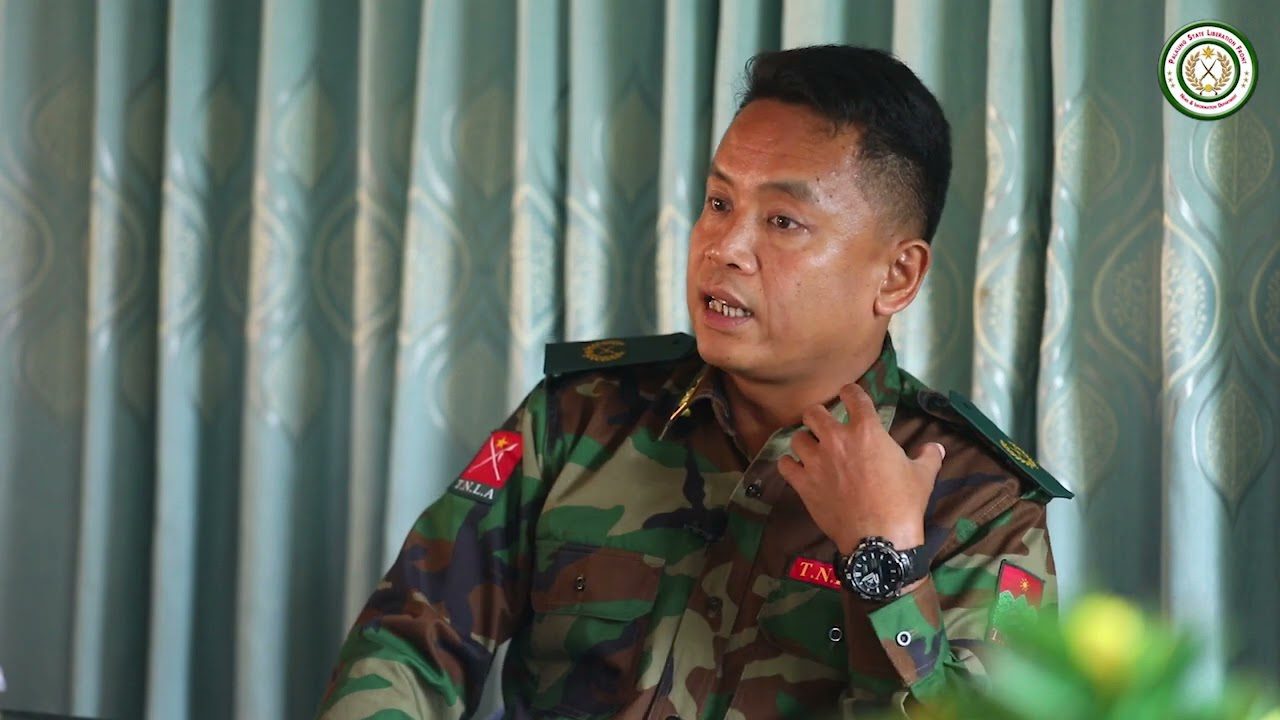
But I believe those who continue to strive will eventually see results. To those who said that we are betrays, I want them to reassess the revolution carefully and hold on to the true realities.”
He continued: “The Spring Revolution was supported with the best resources we had, accumulated over more than 10 years. We fed, trained, and built up the fighters who raised the three-finger salute.Within 3–4 years, we provided manpower in the thousands.Now we are burdened with weapons debt exceeding a billion US dollars.”
The TNLA did not specify to which armed organization it owes this large weapons debt.
However, other armed groups say that the TNLA’s weapons debt is owed to the UWSA (United Wa State Army).
Major General Tar Bhone Kyaw further stated that:“We threw ourselves headfirst at the wall of dictatorship.Our foreheads were blood-red and we nearly died.When the Bamar called D Day, we could not join them, but we tried to keep up with our momentum.When we actually carried out Operation 1027, no real D-Day came from them.In the end, we were left alone, and even our own relatives in the villages suffered airstrikes.”
He continued:“Our hearts ache.We have no ammunition, no budget, and there is in the decrease of people to die.So we had to give up Mogok and Momauk and agree to a ceasefire.The struggle is not over yet, but the insults are overwhelming.Oh dear… Those whom we fed and raised into capable people — I want to see whether they can retake Mogok.Lash out at us after taking a rest and fight against the military dictator after taking a rest.For revolutionaries, our doors remain open.If needed, come and take shelter.”
The TNLA launched Operation 1027 jointly with allied forces on October 27, 2023, and began the second phase in June 2024.
Although the group captured 12 townships, from June 2025 onward the Myanmar military gradually regained control over Naungcho, Kyaukme, Hsipaw, Mogok, Momauk, and other areas.

- By CNI
- Category: English Section
- Hits: 228
CNI News
2 December 2025
The Tai Leng (Shanni) Nationalities Development Party (TNDP) is presenting four key points to the public and is mobilizing people based on these four points, said TNDP Chairman Sai Htay Aung in an interview with CNI News.
The Union Election Commission (UEC) has warned political parties to comply with election laws and regulations during public gatherings, speeches, and campaign activities.
The upcoming multi-party general elections will begin on December 28, and during the 60-day campaign period, candidates may put up party signboards in their respective constituencies and distribute pamphlets as part of their campaign activities.
TNDP Chairman Sai Htay Aung said they are explaining to the public what kind of future would be best for Myanmar and are mobilizing support based on that vision.
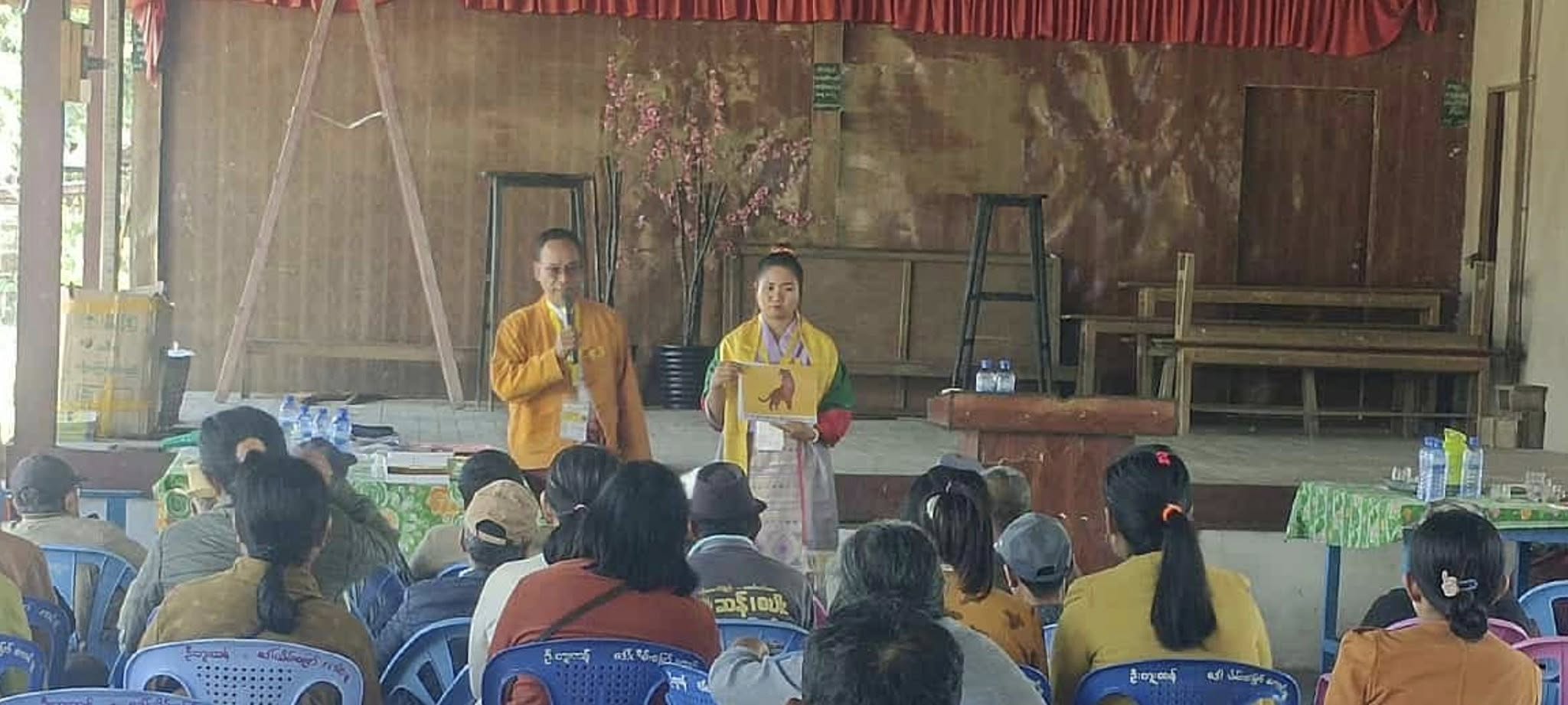
TNDP party delivering a public mobilization speech
He said: “We first explain to the people what type of future system would be best for the country, and then we mobilize. Peace is the most important thing for the people of Myanmar.
When there is no peace, people suffer like this. When the wars stop, peace will come, and with peace, development will be possible.So our Point No. 1 is peace.Point No. 2 concerns our Shanni (Tai Leng) ethnic group.Even though we have strong historical evidence, our ethnic identity has been divided into many subgroups — so we talk about the issue of ethnic identity.Point No. 3 concerns our farmers.We address how to improve the livelihoods of farmers in Myanmar.
And Point No. 4 is constitutional amendment.These are our four main points for mobilization.
These four points are also our four areas of work that we present to the public.As for how other parties mobilize, I have only heard about it.”
The UEC announced on October 15 that campaign activities for the general elections starting December 28 may take place within the 60-day period from 6 a.m. on October 28 to midnight on December 26.
TNDP Chairman Sai Htay Aung also said that people in Kachin State are suffering heavily from high commodity prices and have reported many complaints.
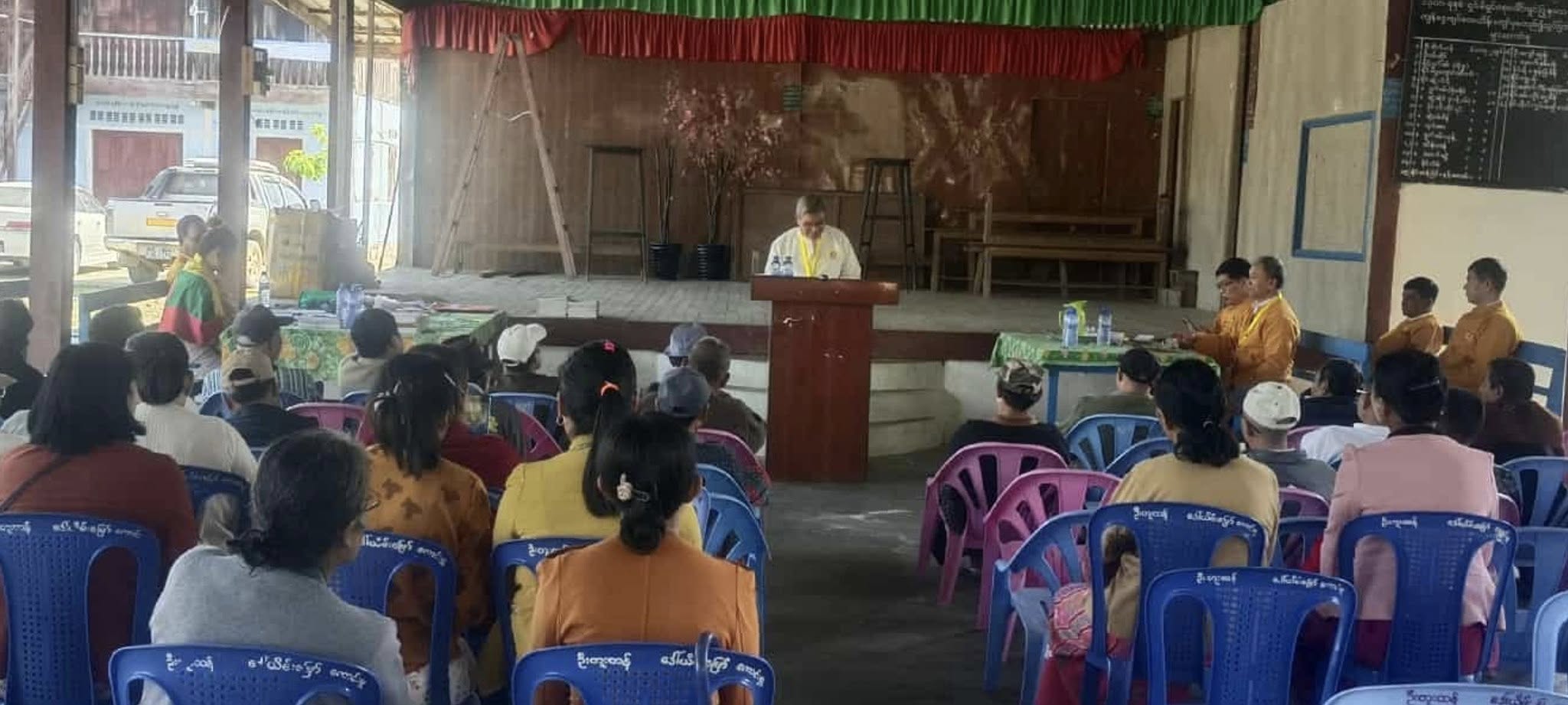
TNDP party delivering a public mobilization speech
He said:“There are many complaints.In our region, Kachin State, people are suffering greatly from the high prices.This is also because peace has not been achieved, and many checkpoints have been set up for inspections, which increases costs and results in high prices.If peace is achieved and the checkpoints disappear, prices would not be this high.Now the prices between Mandalay and Myitkyina differ threefold.So when we talk about peace as our main point, it is also because people have raised these issues.I also have to explain this in return.As for national development, it can only happen once peace is achieved.Therefore, our top priority is peace.”
In Myanmar, Phase (1) of the general elections will be held on December 28, 2025, followed by Phase (2) on January 11, 2026.
Phase (3) will be held in late January 2026, according to the National Defense and Security Council’s Information Team Chief, Maj-Gen Zaw Min Tun, on November 10.

- By CNI
- Category: English Section
- Hits: 219
CNI News
2 December 2025
Education staff serving in Banmauk Township, in the northern part of Sagaing Region, have not received their salaries and have been forced to borrow money from local business owners to cover their daily living expenses, according to sources.
A total of 338 education staff in Banmauk Township have not been paid and collectively borrowed 240 million kyats from local business owners.
It is learned from the staff that the borrowed amount is being distributed among the 338 currently serving staff by the Banmauk Township Deputy Township Education Officer and the Education Liaison Officers.
Regarding the unpaid salaries of staff in Banmauk Township and their need to borrow money from local business owners, staff members said that Shanni Nationalities Army (SNA) Brigade 614 helped them coordinate access to the loans.
CNI contacted the Ministry of Education and the Sagaing Region Government regarding the situation of the 338 unpaid education staff and their borrowing of money from business owners in Banmauk, but as of today, no response has been received.
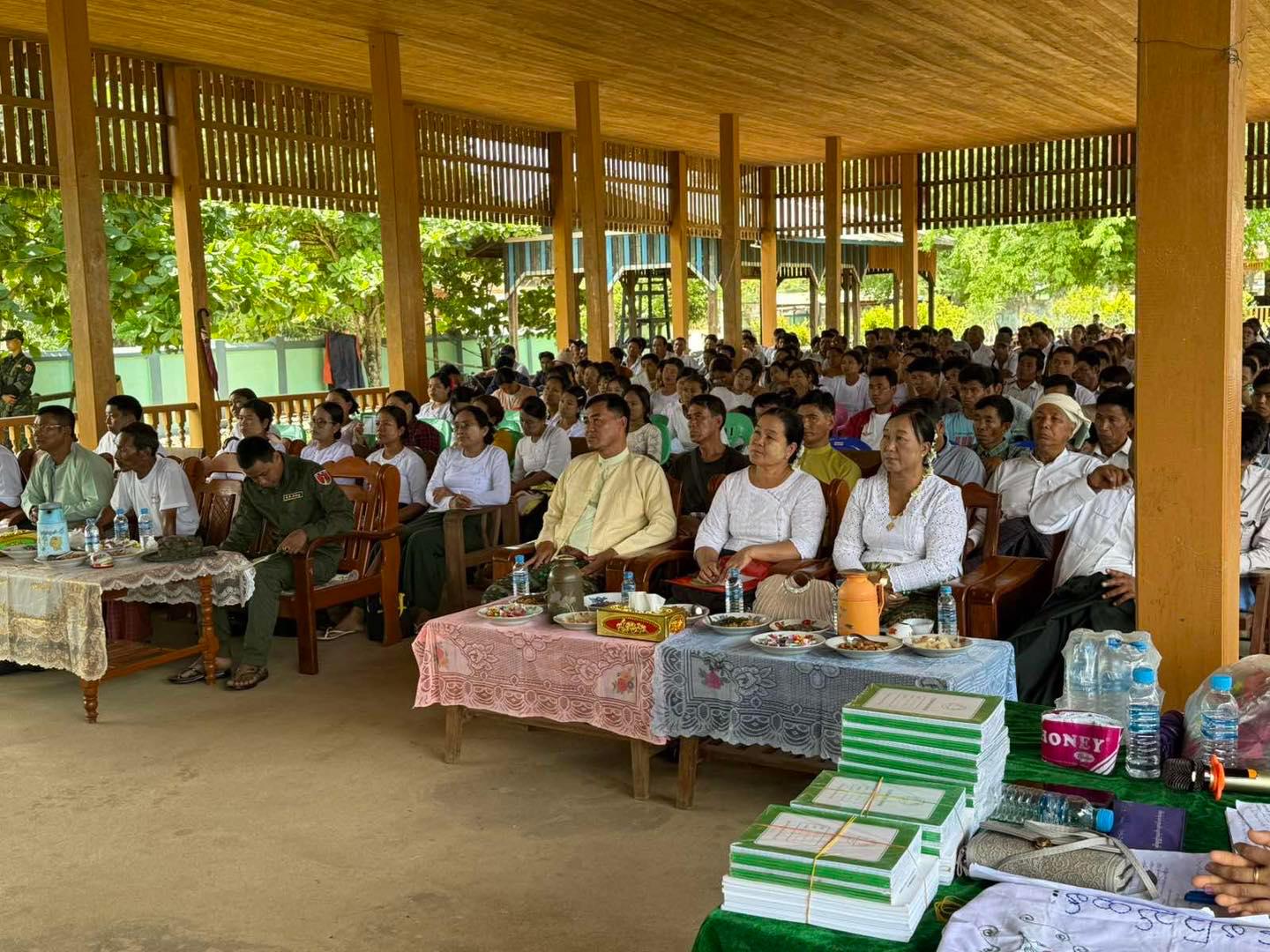
Education staff in Banmauk Township
Banmauk Town, including its southern, northern, and eastern areas, is currently controlled by a joint force of the Kachin Independence Army (KIA), People’s Defence Forces (PDF), and Kadu armed groups.
KIA–PDF–Kadu joint forces launched an offensive attack on Banmauk on September 15, 2025, captured it on September 20, and have maintained control up to the present.
The Myanmar military (Tatmadaw) has been trying for more than two months to retake Banmauk but has been unsuccessful. The commander of the Northwestern Command, Maj-Gen Myo Min Htwe, has also been removed from his position.

- By CNI
- Category: English Section
- Hits: 428
CNI News
2 December 2025
As the United Wa State Army (UWSA/“Wa” group) is no longer supplying weapons, People’s Defense Forces (PDFs) are shifting their supply route and establishing links with the Kachin Independence Army (KIA), according to military and political analysts who spoke to CNI News.
Previously, PDFs operating in eastern Myanmar were connected through the TNLA, receiving weapons from the “Wa” group. However, since the Wa group is no longer providing arms—and the TNLA has also entered a ceasefire with the Myanmar military(Tatmadaw)—PDF and allied forces are now required to withdraw from Mogok and Momeik.
Regarding the withdrawal from Mogok and Momeik, tensions have reportedly risen between the TNLA and the PDFs. While PDFs are now establishing links with the KIA, this makes the withdrawal process more complicated, said political analyst Saing Mein, speaking to CNI News.
He said:“If the PDF and TNLA do not have clear discussions, clear understanding, and fair negotiations, it won’t be smooth—just like when MNDAA handed Lashio over to the Myanmar military.Also, before TNLA captured Momeik, KIA had already entered and controlled it for more than two weeks.Since Momeik is adjacent to the territories the KIA has controlled, unless pressure is placed on the KIA, and unless KIA decides on a ceasefire like TNLA, things won’t easily settle.Previously in the east, PDFs connected through TNLA. But now the Wa group has announced it will no longer supply weapons to other armed groups and even executed people involved in transporting weaponry.With this situation, PDFs are rerouting and connecting with the strong KIA forces in northern Myanmar. So it’s unlikely that this issue will be resolved easily.”
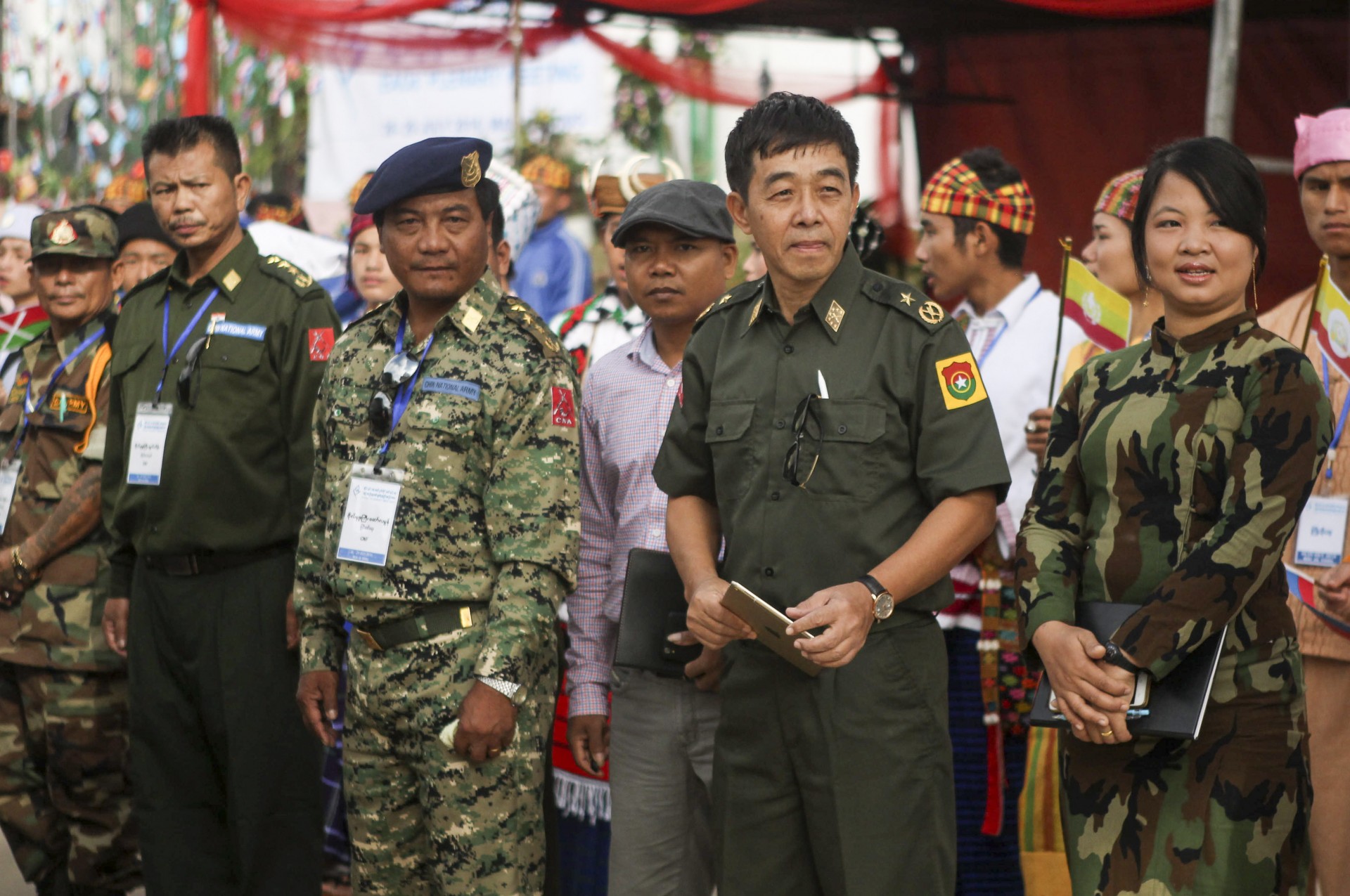
Lt-Gen Gun Maw with other armed groups
KIA has expanded its strength and operations across northern Shan State, Kachin State, and into Sagaing Region, standing as one of the most powerful ethnic armed organizations.
KIA is also one of the armed groups in Myanmar capable of producing its own ammunition, and it remains a militarily strong organization.
Following the political changes caused by the February 1, 2021 military coup that ousted the NLD government, the KIA was able to further expand its military capacity and widen its controlled territories.
Since the political crisis of 2021, KIA has been providing military training, weapons, ammunition, joint operations, and the sale of ammunition to PDFs and local defense forces (LDFs) in Sagaing Region.
According to Col. Khun Okkar, chairman of the Pa-O National Liberation Organization (PNLO–NCA/S), the KIA is currently cooperating with revolutionary forces based on political needs, but in the future—like the MNDAA and TNLA—it may take different actions if its political situation requires it.
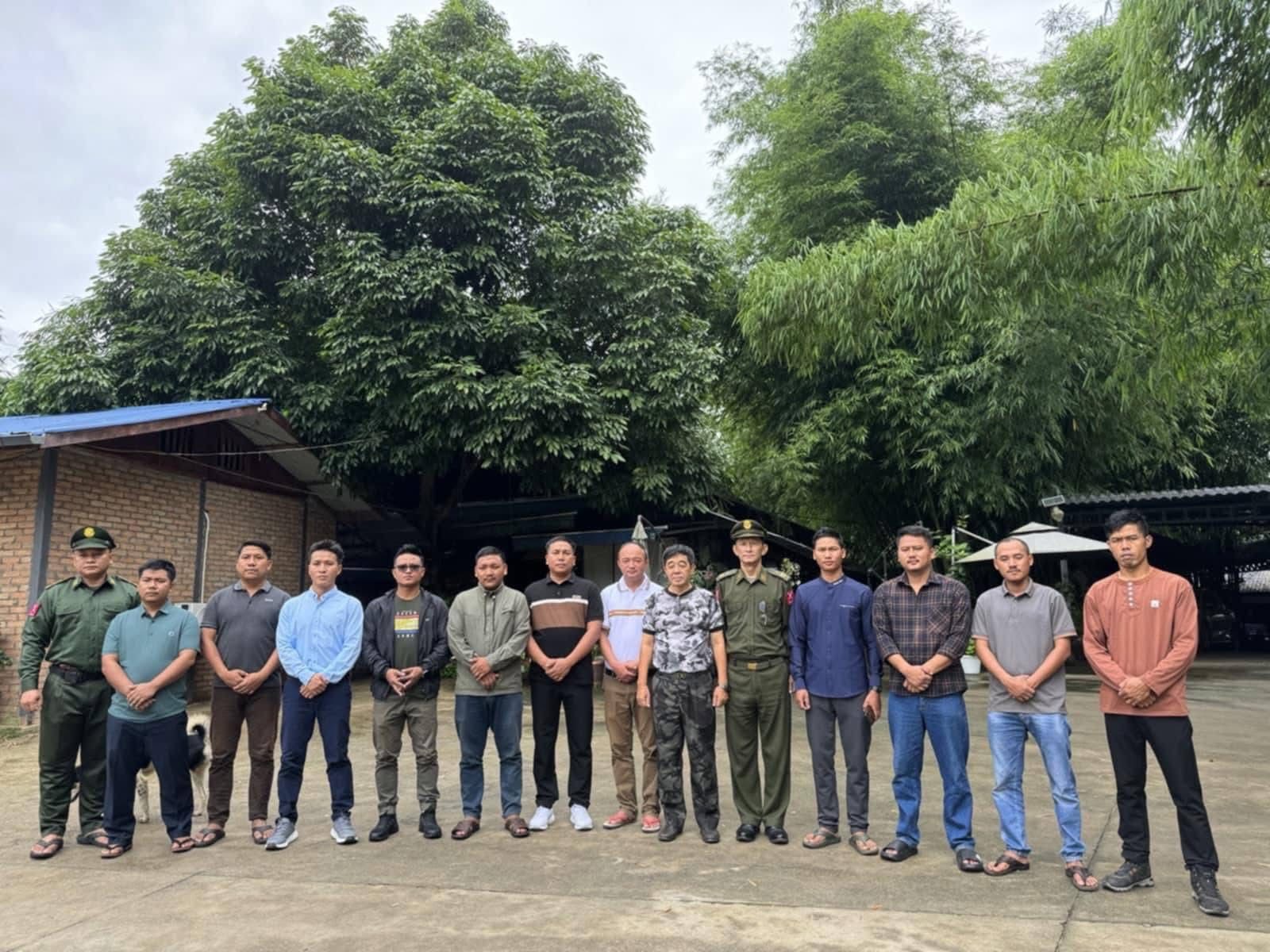
Chin Brotherhood delegation meeting with Lt-Gen Gun Maw
He said:“PDFs need weapons, ammunition, and logistics. If they cannot obtain them elsewhere, they will turn to the KIA, which already has arms factories and can produce weapons and fuel.This means connecting with the KIO can also be for supply routes.
If someday the KIA needs a political settlement, it could change its stance.The KIA is not participating in talks yet. With fighting on the ground, PDFs will naturally try to benefit from the KIA.But if a political solution emerges later, the KIA will consider its own interests regarding the PDFs.For now, they are cooperating out of current needs. If those needs change, the situation may resemble Kokang or Palaung (TNLA). It likely won’t be very different.”
The KIA has been coordinating with PDFs, KNA-Burma (Kuki), Naga armed groups such as ENDA/ENNO and NPDF, ABSDF, AA, and CNDF to strengthen control over multiple areas in Sagaing Region, including Hkamti, Banmauk, Tigyaing, Tamu, Hkam Pat, Phaung Byin, Shwe Pyi Aye, Mawlike, Katha, Kawlin, Pinlebu, and Indaw, as well as across Naga territories.
Furthermore, in August, representatives of Chin organizations—including the Chin National Council (Mindtat), Chin National Front (CNO/CNDF), Zomi Federal Union (ZFU), Chin Defense Force (Kanpetlet), Chinland Defense Force (Matupi Brigade 1), and Mara Territory Council (MTC/MDF)—visited Laiza at the invitation of KIA Vice Chairman Lt-Gen Gun Maw.

- By CNI
- Category: English Section
- Hits: 280
CNI News
2 December 2025
The Ta’ang National Liberation Army (TNLA), which had attacked and captured Mogok in Mandalay Region, said that it had “no words to apologize” to the public regarding its withdrawal and the handover of the town back into the hands of the Myanmar military(Tatmadaw).
This was stated by TNLA General Secretary Major General Tar Bone Kyaw in a written announcement.
On December 1, 2025, Maj-Gen Tar Bone Kyaw released a poem titled “The Northern Cool Breeze”, in which he expressed this sentiment.
TNLA and allied PDF forces captured Mogok from the Myanmar military in June 2024.
Afterwards, through China’s mediation, the Myanmar military and TNLA held nine rounds of talks in Kunming, China throughout 2025, and both sides agreed that TNLA forces would withdraw from Mogok and Momeik.
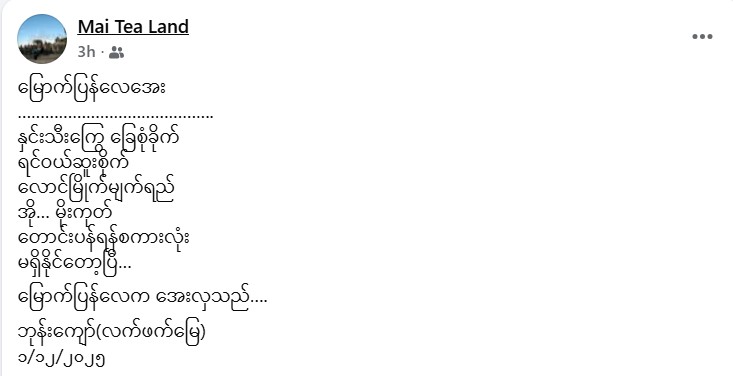
Tar Bone Kyaw’s written statement.
According to this agreement, TNLA ensured full security and escorted the Myanmar military back into Mogok on November 29, 2025, officially handing the town over.
As a result, the PDFs that had cooperated with TNLA in the offensive also had to withdraw from Mogok and Moemeik, and they were cautioned not to continue launching attacks.

- By CNI
- Category: English Section
- Hits: 296
CNI News
29 November 2025
The new government that emerges after the election needs to be flexible, gentle, and decisive, said Sai Htay Aung, Chairman of the Tai Leng (Shanni) Nationalities Development Party (TNDP), to CNI News.
In Myanmar, the 2025 general election will be held in three phases: Phase (1) on December 28, 2025,Phase (2) on January 11, 2026, and Phase (3) in the last week of January 2026.
After these elections, state power will be transferred to the winning party, and the military will take responsibility only for national defense, according to Senior General Min Aung Hlaing, Chairman of the National Security and Peace Commission.
The public hopes that the new government formed after the election will work for the benefit of the nation. Sai Htay Aung stated that this upcoming civilian government must be flexible, gentle, and decisive.
He said:“People can have high expectations for the new government. Why? Because the government will be responsible for making things much better than the current situation.This new government will be formed by the people’s vote. So, it must dutifully serve the responsibilities entrusted by the people, with love and devotion for the country and the public.But there will be major responsibilities ahead. There will be a lot of reconstruction to do — both physical reconstruction and mental reconstruction.For that, the government must be flexible and gentle, but also decisive. When it decides to carry out something, it must follow through. It must have the courage to make firm decisions by considering the faces of the country and the people. Only then will this new government be able to bring stability and peace and build development.”
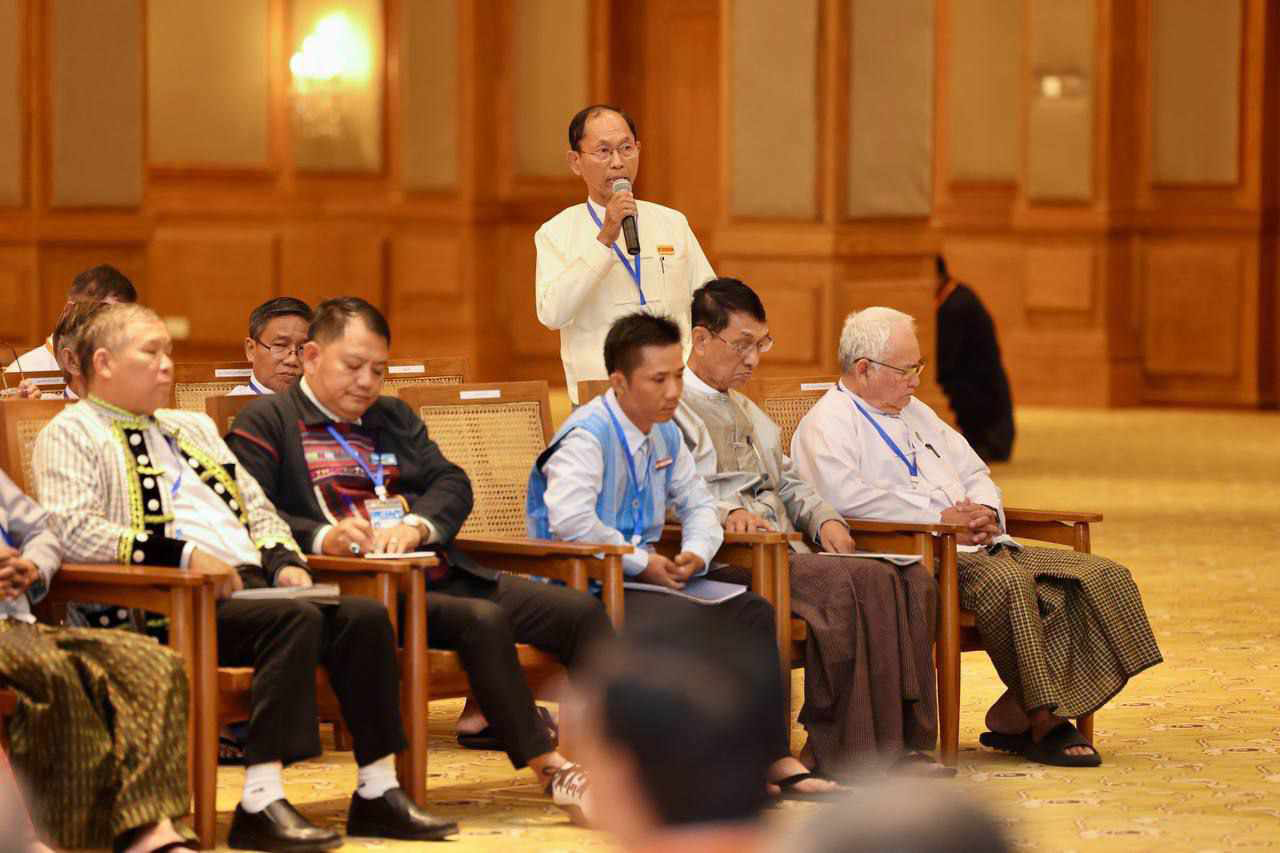
Political parties meeting
Political observers warn that if the civilian government emerging after the election cannot exert authority over the administrative mechanism, the country may once again have to rely on the military.
Sai Htay Aung added that although the new government will face difficulties, he does not believe it will encounter challenges worse than the current crisis.
He said:“I don’t think the new government will face a situation worse than now. Why? Because on one side, the NUG has already fractured.And the PDFs, who were committed to changing the country through armed struggle, have been disappointed. Since they are discouraged, I don’t think the new government will have to face more difficult challenges than the present.”
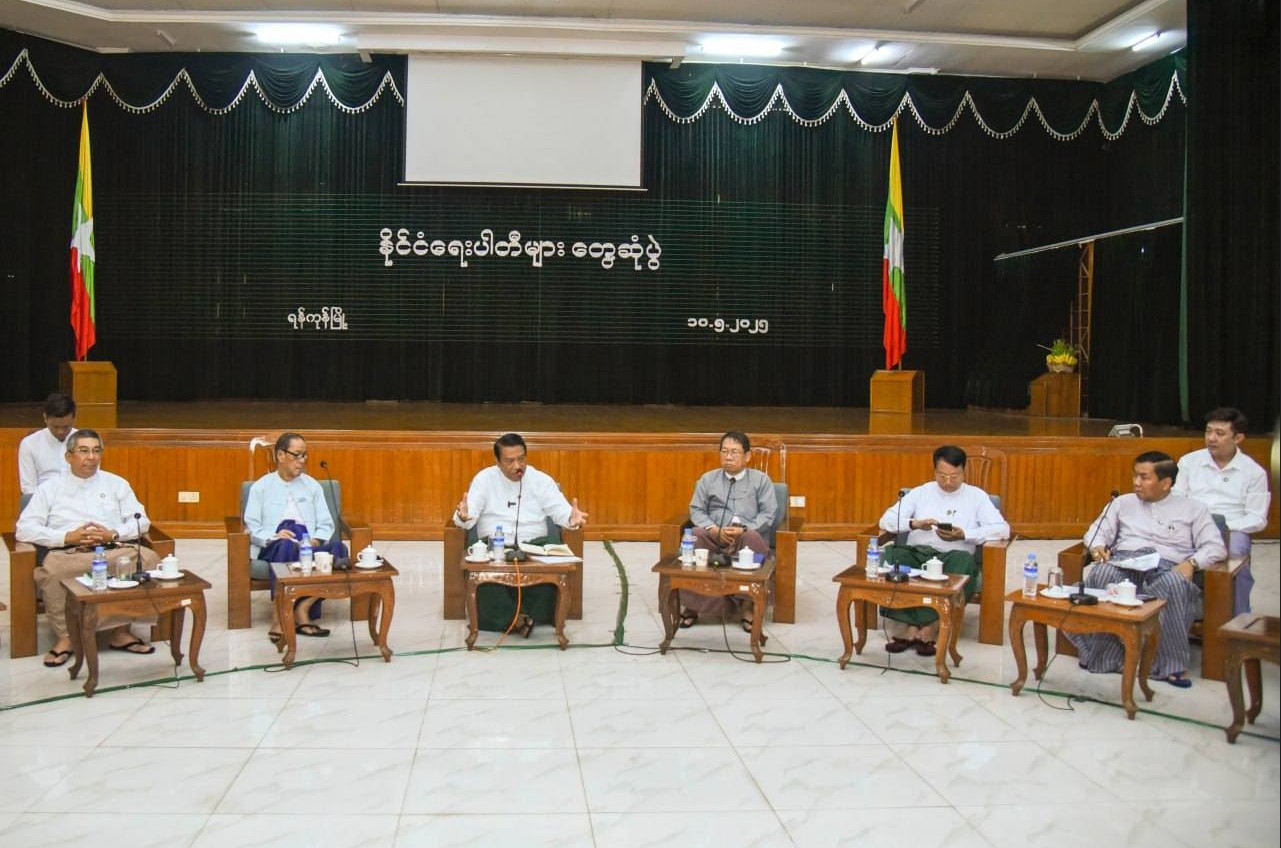
Political party leaders at a meeting
However, Colonel Saw Kyaw Nyunt, spokesperson for the 7 EAO Alliance, said it will be extremely difficult for the public to place high expectations on the new government.
He said:“It will be very difficult to have high expectations on the government that will emerge after the election.Why? Because this election is being held in an abnormal political situation that our country has never experienced before.So whatever emerges from this will not immediately lead to the peace, democracy, and federalism that the people long for. However, through international cooperation and pressure, or through new pathways that open up even in difficult circumstances, some level of hope may still arise.”
Senior General Min Aung Hlaing also said that the upcoming election will bring a turning point for the country, and that people must elect those who safeguard Our Three Main National Causes.

- By CNI
- Category: English Section
- Hits: 457
CNI Article
28 November 2025
By Chit Min Tun
Sagaing Region and Chin State, located in Myanmar’s northwestern area, have become well-known since after 2021 as territories dominated by revolutionary forces and rebel groups.
This is in contrast to the years before 2020, when Sagaing Region and Chin State were generally peaceful, stable areas where such revolutionary or rebel groups could not exert control.
However, after 2021, so many revolutionary/insurgent groups emerged, and armed conflicts escalated to the level of town-capture battles. As a result, hundreds of thousands of civilians were displaced and forced to flee the conflict.
Consequently, people were unable to continue their agricultural and livestock activities, and trade flows were severely disrupted. This led to price inflation and shortages of essential goods.
In addition, citizens holding Sagaing Region ID (5/) or Chin State ID (4/) have faced strict inspections when traveling to other regions.
These conditions have resulted from ongoing instability and warfare across the entire northwestern region.
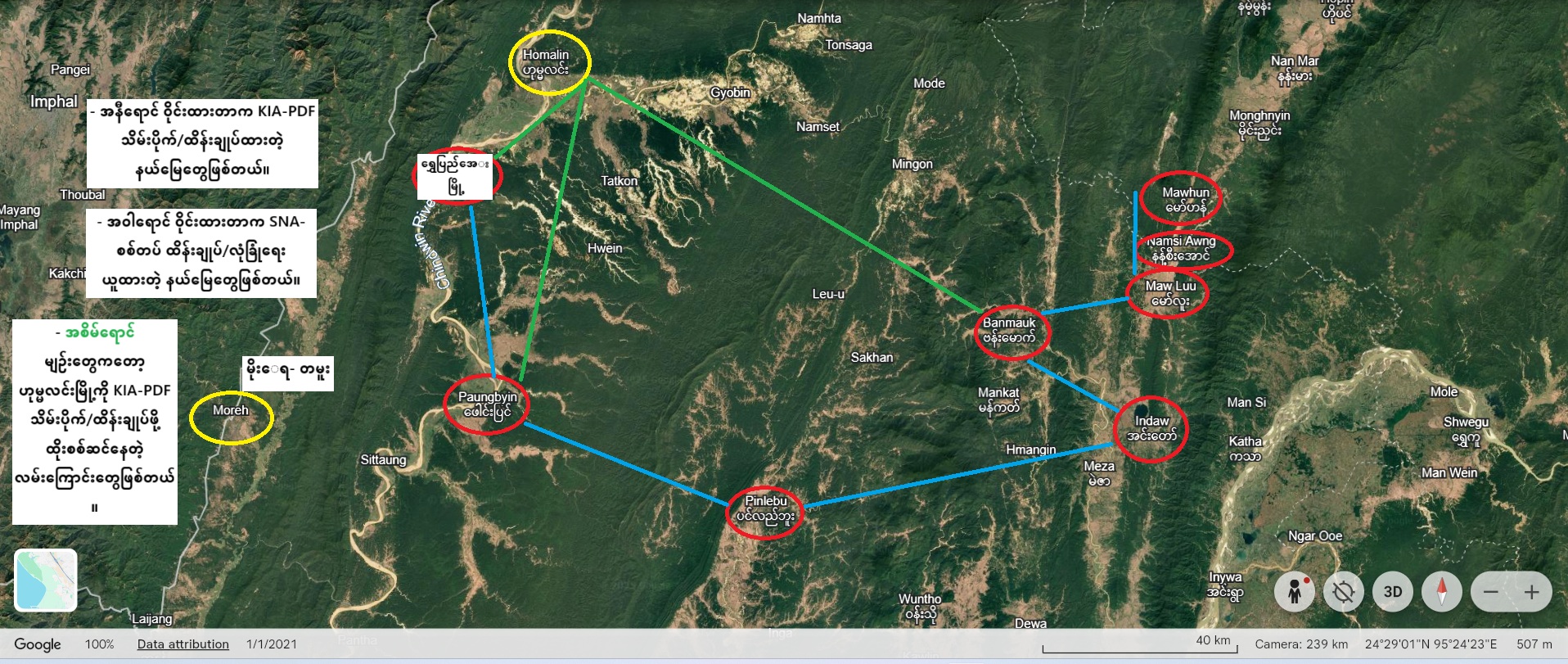
Towns controlled by armed groups
To bring an end to the conflicts and restore stability, the Northwest Command (NaMaHka) holds primary responsibility. Therefore, it must answer a critical question: How will the NaMaHka Command manage and resolve the dominance of revolutionary/insurgent groups across the northwestern region?
As this question remained unanswered — and due to alleged abuses of authority and corruption — Northwest Command Commander Brig-Gen Myo Min Htwe was arrested in November 2025 and removed from his post.
After his removal, Maj-Gen Kyaw Thu Ya was appointed as the new Commander of the Northwest Command.
Thus, Commander Maj-Gen Kyaw Thu Ya now faces the task of prioritizing the cessation of hostilities and restoration of stability in Sagaing Region and Chin State.
The NaMaHka Command is expected to attempt to retake the towns under insurgent control in Sagaing Region, such as: Indaw, Banmauk, Pinlebu, Shwe Pyi Aye, Hkamti, Kham Pat.
It must also prioritize control over the major highways, including: Monywa–Mandalay Highway, Shwebo–Mandalay Highway, Mandalay–Shwebo–Myitkyina Highway.
Additionally, the command may attempt to secure the Tamu–Kham Pat–Monywa route and the Himawinta Road.
Similarly, if the NaMaHka Command manages to secure the access routes from Sagaing Region into Chin State, it may attempt further offensives into Chin State areas dominated by insurgent forces.
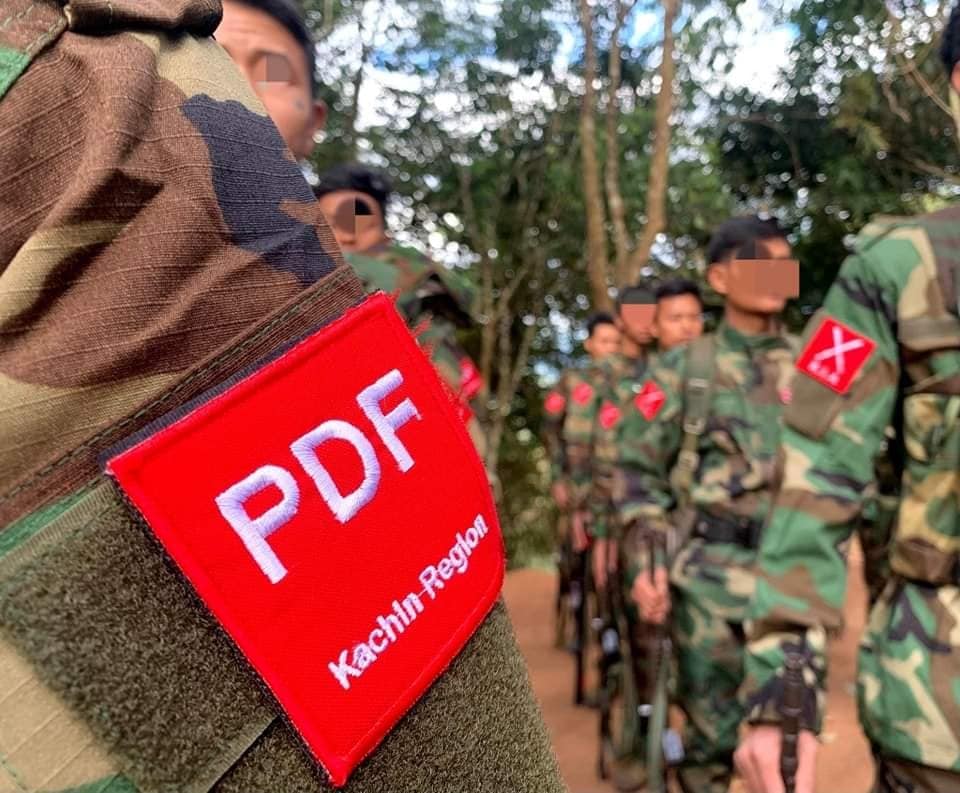
KIA–PDF joint forces
However, the command still faces major questions:
Does the Northwest Command have enough manpower to launch these operations? If not, how will they gather or consolidate additional forces? Which forces will they ally with to strengthen their capabilities?
In Sagaing Region, the following groups currently act as intermediaries or maintain a presence:
Shanni Nationalities Army (SNA)၊ NSCN-K/AM၊ NSCN-K/YA၊ NSCN-IM၊ NSCN-IM/HS၊ Meitei armed groups.
Kuki Nationalities Army (KNA/KNO), ENNO/ENDA and Naga PDF are fighting against the Tatmadaw.
Meanwhile, numerous PDFs from townships such as Homalin, Hkamti, Phaung Byin, Mawlike, Tamu, Kale, Mingin, Kantbalu, Indaw, Banmauk, Shwebo, Monywa, Yinmabin, Pale, Wetlet, Tigyaing, Kham Pat — operate under, or in alliance with, the Kachin Independence Army (KIA), engaging in attacks against the Myanmar military (Tatmadaw).
Similarly, the Arakan Army (AA), ABSDF, Karen National Union (KNU), and Chin National Front (CNF) are active in Sagaing Region and are also attacking the Myanmar military.
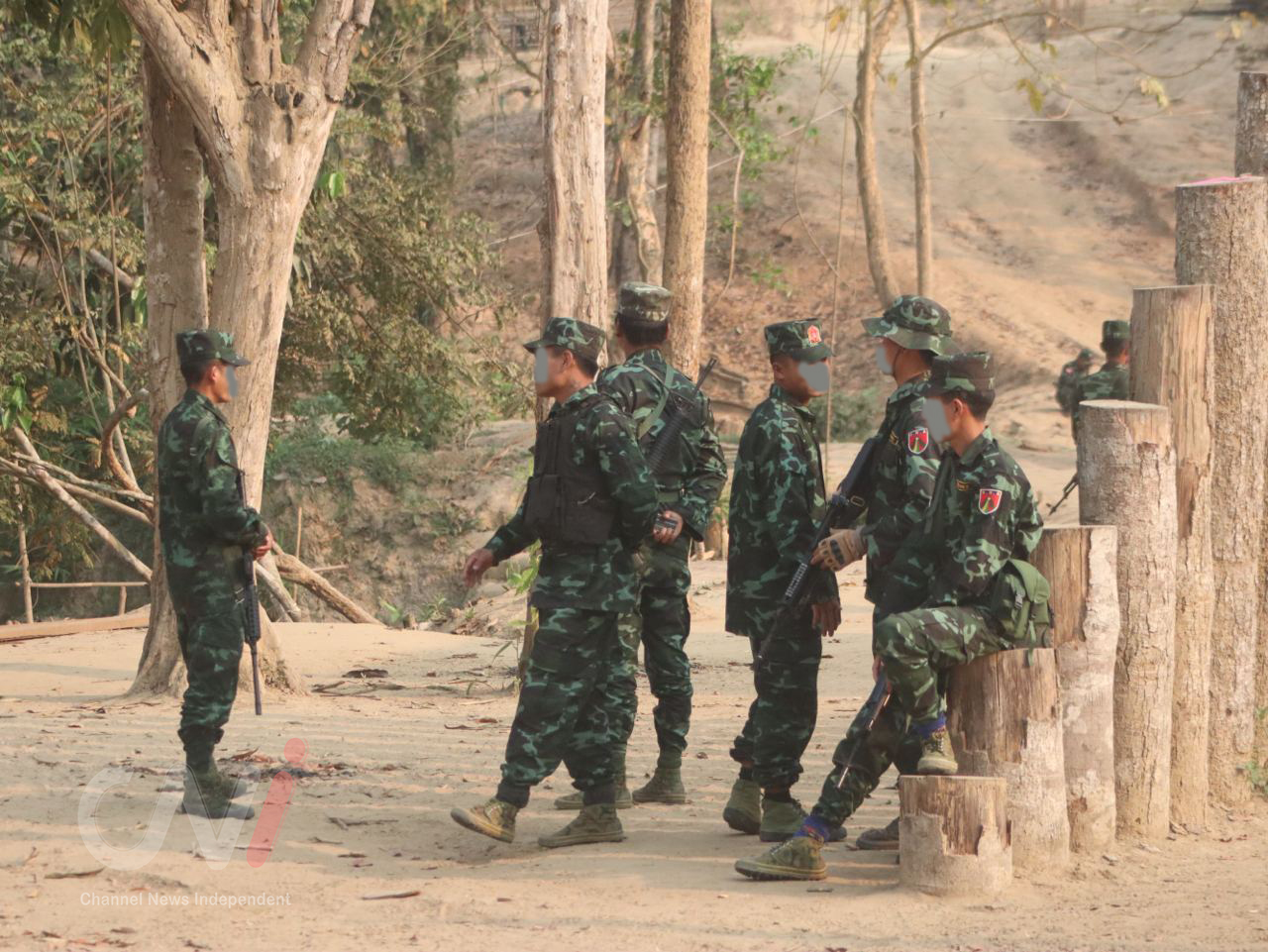
Shanni Nationalities Army (SNA)
Inside Chin State, the Zomi Revolutionary Army (ZRA/ZRO) and Kuki armed groups maintain a neutral stance, while CNF, AA, and various Chin-ethnic PDFs continue to fight the Myanmar military.
With so many revolutionary/insurgent groups dominating the northwestern region, it is extremely difficult for the Northwest Command to bring stability or end the conflicts — making it a highly complex problem.
In any case, Sagaing Region and Chin State will never return to their pre-2020 conditions.
This is because there are now hundreds of armed groups, and there is no possibility of fully disarming them.
For this reason, the challenges for the Northwest Command will likely persist even after the elections.
Whether the command can find a solution during or after the election period remains to be seen — otherwise, this situation will continue to be a major headache for the Northwest Command.

- By CNI
- Category: English Section
- Hits: 295
CNI News
28 November 2025
The National Defence and Security Council (NDSC) announced on 26 November 2025 that 2,361 prisoners who had been convicted under Section 505(a) of the Penal Code and were serving sentences in various prisons, jails, and detention camps have been granted amnesty, with their remaining sentences reduced.
In addition, 724 prisoners who were also convicted under Section 505(a) and are currently serving sentences in prisons, jails, and detention camps have been granted a conditional reduction of their remaining sentences.
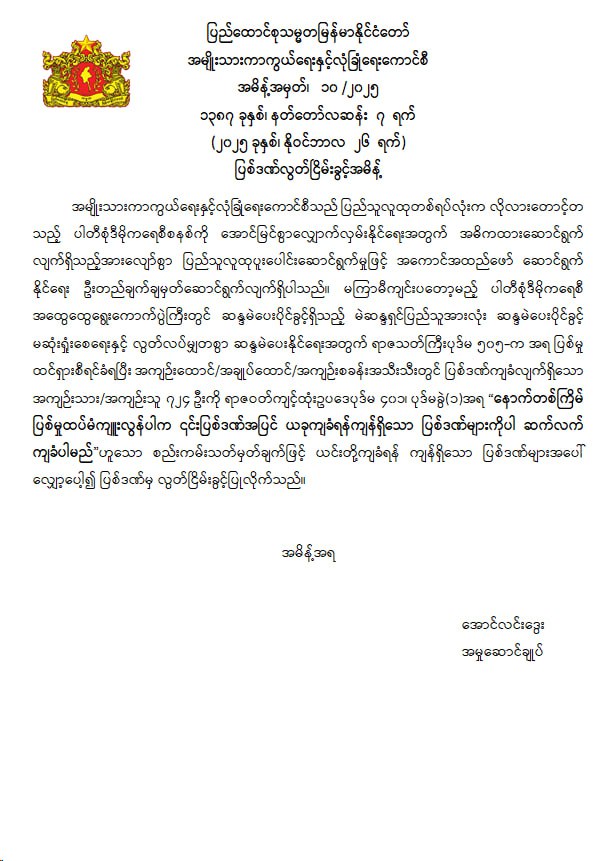
The condition states that:“If they commit another offense in the future, they will have to serve not only the new sentence but also the remaining portion of their current sentence.”
The NDSC stated that the purpose of granting this amnesty is to enable all eligible voters to cast their ballots freely and fairly in the upcoming multi-party democratic general election.

- By CNI
- Category: English Section
- Hits: 362
CNI News
28 November 2025
The Union Solidarity and Development Party (USDP) has prepared ways to handle and resolve the current hardships faced by the public, according to USDP spokesperson U Thein Tun Oo, speaking to CNI News.
In Myanmar, Part (1) of the general multi-party democratic election will be held on 28 December 2025, Part (2) on 11 January 2026, and Part (3) in the last week of January 2026.
USDP spokesperson U Thein Tun Oo said that the party has plans to address the difficulties and hardships currently affecting the people.
He said:“Mainly, for commodity price stability—if the people choose us and vote for us, we guarantee price stability.And for a more stable and peaceful environment,We have systems and methods prepared, and we will implement them together with our programs. Among the many points included in our election manifesto, we prioritize these two.For example, if we talk about regular electricity supply:if the people support the organization that has workable methods,that organization must already have calculated and prepared ways to provide regular electricity.If the people choose and entrust us, we already have methods for ensuring regular electricity supply.Other parties may also have their own plans.
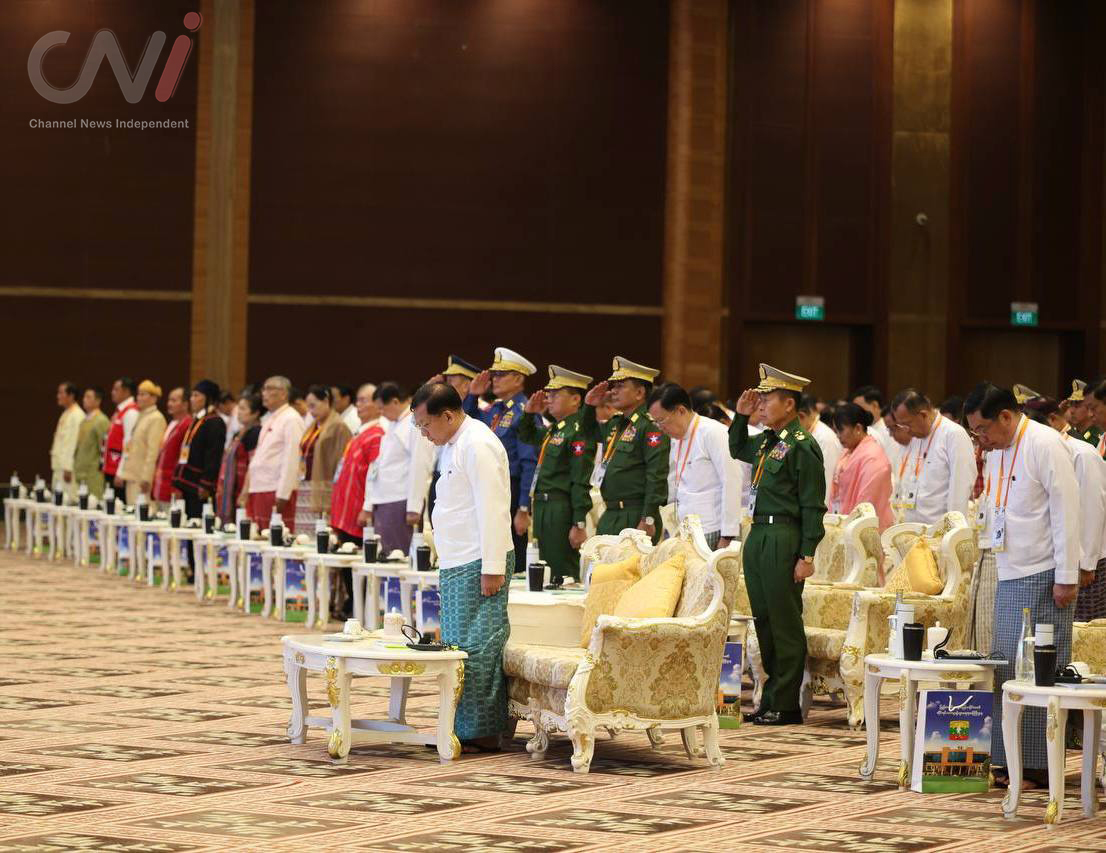
Armed group leaders, military and civilian leaders together
It depends on the situation on the ground.It’s difficult to say how long it will take, but we will work with the best and fastest methods.”
Currently, the public is suffering from rising commodity prices and higher cost of living, lack of job opportunities, irregular electricity supply despite higher meter fees, and other issues.
People also face illegal arrests under the conscription law, extortion, weak rule of law, crimes such as theft and robbery, unsafe travel, and illegal activities by armed groups, according to public feedback.
Despite these hardships, most political parties have not yet given clear and strong commitments during their campaigns that they will solve these problems.
During the campaign period, most political parties have not been able to give strong promises to resolve the people’s current difficulties, said Sai Htay Aung, Chairman of the Tai Leng (Shanni) Nationalities Development Party (TNDP).
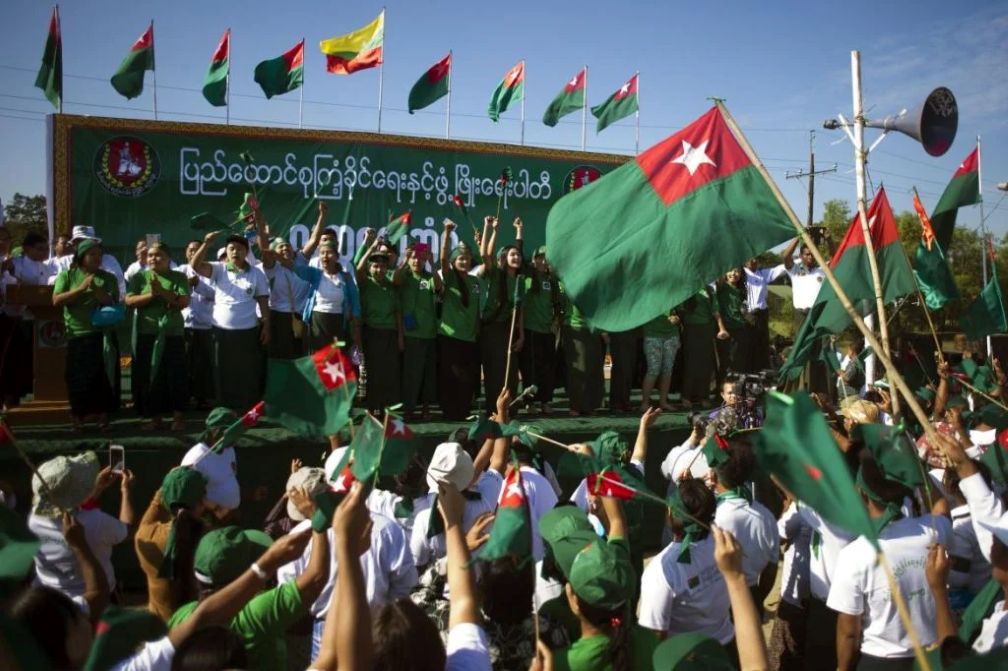
USDP party conducting campaign activities
He said:“Almost no party has been able to give such guarantees.For now, the only party speaking boldly about these issues seems to be the USDP.They're talking about it a lot. But people are also considering whether they can really deliver.Based on what the people demand, political parties can’t meet those demands yet.After the election, once the parliament (Hluttaw) emerges, the people’s voice will also emerge.If parliament exists, it will speak. The government will then be able to act.At present, one person alone controls all three branches of power.After the election, when the three branches operate separately,
there will be a check and balance system.When that time comes, once the people’s voices emerge,many of the difficulties faced by the people will significantly improve.”
In the upcoming election, USDP is seen as having advantages due to the support of the Myanmar military (Tatmadaw), as well as due to the election laws, political party registration laws, and the widespread armed conflicts, according to political observers.
Observers inside and outside the country have noted that the upcoming election in Myanmar will be an election in name only, and that regardless of the results, the outcome will be a government led by the military and the USDP.



